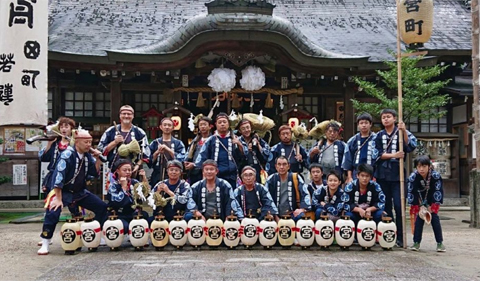
Thompson and his troupe mates on Oct. 13, 2018, on the afternoon before the start of the Asuke Fall Matsuri after being blessed by the head priest of Asuke Hachimangū Shrine.
The Linguistics Colloquium series presents Dr. Chris Thompson discussing “Thunderous Blasts: Folk Spirituality, Matchlock Muskets, and the Asuke Fall Festival in Aichi, Japan” on Friday, Nov. 5, from 12:55 to 1:50 p.m. in Gordy 301 or via Microsoft TEAMS.
Join on your computer or mobile app
- Join the meeting on Teams.
- Or call in (audio only) +1 614-706-6572,,914855010# United States, Columbus, Phone Conference ID: 914 855 010#
Contact Dr. David Bell, linguistics chair, belld@ohio.edu, for questions.
Thompson is associate professor of Linguistics and director of Japan study abroad: Chubu Program, Hokuriku Program, and IPU Program.
Abstract: Each year on the second Sunday of October, the Miyamachi Musket Troupe in Asuke, Japan. (near Nagoya) fire their matchlocks to protect the Gods during the town’s annual fall shrine festival. While extensive scholarship exists on matsuri (festivals) in Japan, there is almost no research on festivals that utilize matchlock muskets in the way residents of Asuke do – as hōnō deppō – votive artillery fired only at matsuri-time for divination purposes. This vacuum is unfortunate, given the special historical significance of hinawajū (matchlock muskets) in the region, and the overall importance of matsuri to the ethnology in Japan. Afterall, unlike the typical ikusa deppō (skirmish guns) also utilized frequently in fall matsuri to remind locals of a feudal ruler’s political and religious authority over them in the distant past, hōnō deppō are blessed specifically for a spiritual purpose, to prepare the town for their annual visit by local Kami (Shinto “God[s]”), who briefly vacate Asuke Hanchimangū Shrine to interact with parishioners. Drawing on an ethnographic approach enbibed by the anthropology of acoustics and ethnomusicology, this paper explores the contemporary role that the musket troupe plays, not just in preserving their local historic tradition but in reconfiguring their local Miyamachi identity for the 21st century in Asuke, an isolated mountain village of less than 10,000 residents only 62 miles from Japan’s fourth largest city.
About Linguistics’ 50th Anniversary Celebration
“We are really looking forward to everyone joining us this year, either live in person or via Microsoft TEAMS to celebrate our anniversary,” said Bell, who also invited alumni and friends to add their names to the donor wall by making a gift, of whatever amount, to the Linguistics Department’s crowdfunding campaign.
He noted that all funds go to support our students’ registration and travel expenses to conferences where they will present their research.
“And please stay in touch! Send us a message on our Linguistics FB page at https://www.facebook.com/LingDeptOHIO,” he added.


















Comments